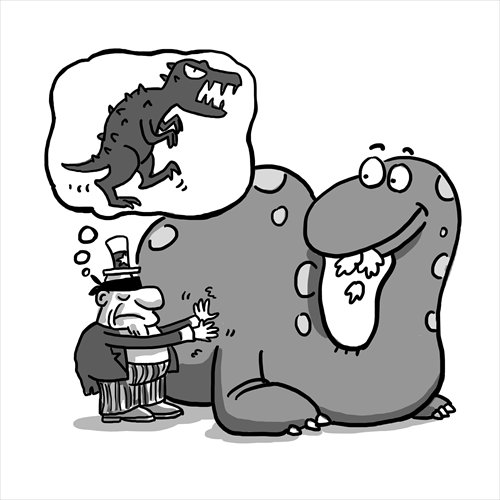HOME >> OP-ED
Misperceptions harm both China and US
By Ding Gang Source:Global Times Published: 2014-5-21 19:28:01

Illustration: Liu Rui/GT
Russian President Vladimir Putin visited China on Tuesday and Wednesday. The two countries are holding a week-long naval exercise in the East China Sea. The summit of the Conference on Interaction and Confidence Building Measures in Asia (CICA) which gathered top leaders from many countries just concluded in Shanghai.
All these may prompt doubts from the West's China watchers: As China and Russia, the two biggest powers in Asia, join hands and China is trying to play a more significant role in constructing the security pattern in Asia, will the Asian order be reshaped? Or will a new order emerge alongside the one dominated by the US?
The CICA mechanism currently still excludes the US and Japan. The two important regional players are only observers.
The world is concerned about the Asian order, mainly because of China's rise. China's scale of power determines that its rise will surely change the Asian order that has long been dominated by the US, but how this change will take place is a question that irritates the West.
It is beyond doubt that it is becoming more and more difficult or even impossible to restrict China's rise. The best approach is to learn to get along with China and make room for China's rise.
Asia's security pattern in the future cannot be dominated by the US alone and in particular by the US-Japan military alliance. China's leading role in Asia's security pattern means that some rules need to be readjusted and also new game rules need to be established.
As its strength rises, China may take a more active attitude in international governance mechanisms including regional organizations.
It will speak out its demands and gain more discourse power in existing mechanisms. It hopes to carry out reforms so as to transfer power from the West.
China will also play a bigger role in regional cooperation and free trade negotiations like what it does in the CICA and the Shanghai Cooperation Organization. It will consolidate its own position by promoting the development of these organizations and negotiations.
China does not want to overthrow the current mechanisms. It does not have such capabilities. The above two approaches are intended to gain some balance to make the current international governance mechanisms more adaptable to China's rise and make sure China is not in a passive position when it is establishing a new type of great power relationship with the US.
It will cause misconceptions of China's rise if people deliberately exaggerate China's efforts in taking part in global governance and interprets these efforts as China's aggression and haste to counter the US.
In China's foreign policies, there is no doctrine that runs against the US. Even when the US Justice Department filed criminal charges against five Chinese army officers for cyber espionage, China has remained constrained.
Sino-US relations are the first priority. Without a stable Sino-US relationship, Asia will not remain stable and there will be more uncertainties that affect China's development.
From a long-term perspective, only when China strengthens its ability for multilateral communication and enhances comprehensive cooperation, can it create a balanced foundation for smooth development of Sino-US ties. That's the essence of creating opportunities for peaceful development.
Domestic opinion should also comprehend China's intention of peaceful development. It does no good to helping the public form a correct understanding of Sino-US relations if people exaggerate China's power and say it is able to challenge the US and build a new order. It may also push China's diplomacy into a passive position.
Meanwhile, if we simply attribute all China's troubles to supposed US maneuvering, we are creating room for conspiracy theories. The US' China policy can easily stir up China's nationalism under the current domestic opinion sphere.
China is still at the initial stage in trying to establish a new balance with the US. It is necessary to leave each other space for knowing the other. It would be dangerous and irresponsible if they treat each other as imagined adversaries.
The author is a senior editor with People's Daily. He is now stationed in Brazil. dinggang@globaltimes.com.cn. Follow him on Twitter at @dinggangchina
Posted in: Ding Gang, Critical Voices